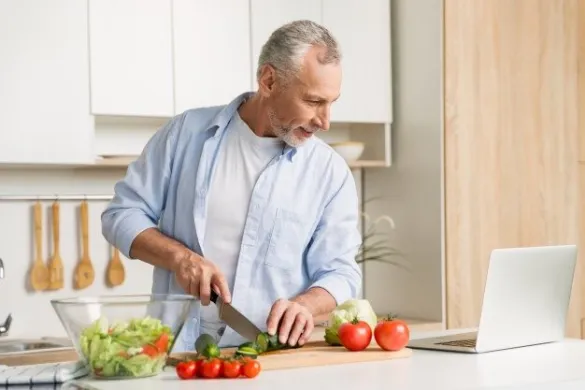Cooking can be an enjoyable and rewarding activity, but as we age, certain challenges may arise. From mobility issues to changes in taste and nutrition needs, it’s important to adapt cooking techniques to ensure that preparing meals remains a positive experience. This blog will explore various cooking techniques that are safe, easy to follow, and conducive to a healthy diet for seniors.
1. Batch Cooking and Meal Prep
- Plan Ahead: Preparing meals in advance can save time and reduce the stress of daily cooking. Choose a day each week to cook larger portions of meals that can be easily stored and reheated throughout the week.
- Portion Control: Divide meals into individual portions and store them in containers. This makes it easy to grab a healthy meal without the need for daily cooking.
- Freezing for Later: Most cooked meals can be frozen for later use. Soups, stews, and casseroles freeze well and can be reheated quickly, making them perfect for busy days.
2. Simplified Cooking Techniques
- One-Pot Meals: One-pot cooking methods, such as stir-frying, slow cooking, or using an Instant Pot, minimize cleanup and simplify the cooking process. These methods allow you to combine multiple ingredients for a complete meal in one pot.
- Microwave Cooking: The microwave is a versatile tool for seniors. It can be used not just for reheating but also for cooking vegetables, steaming fish, and even baking potatoes. Using microwave-safe containers makes this method safe and efficient.
- Sheet Pan Dinners: Cooking everything on a single sheet pan can simplify meal preparation. Arrange proteins, vegetables, and seasonings on a baking sheet and roast them in the oven for a hassle-free meal.
3. Healthy Cooking Methods
- Steaming: Steaming is a healthy cooking method that preserves the nutrients in vegetables. Use a steam basket or microwave steam bags to easily prepare healthy sides.
- Grilling: Grilling can be a healthy cooking option that adds flavor without needing excess oil or fat. Use indoor electric grills or outdoor grills, depending on mobility and comfort.
- Sautéing: Sautéing with a small amount of healthy oil (like olive oil) can enhance flavor while using less fat compared to frying. Use non-stick pans to reduce the amount of oil needed and simplify cleanup.
4. Adapted Tools and Equipment
- Ergonomic Utensils: Look for utensils and tools designed for ease of use. Ergonomic handles can help seniors with grip strength issues.
- Cutting Boards with Grip: Use cutting boards with non-slip grips to stabilize food while chopping. This helps prevent accidents and makes food preparation easier.
- Electric Appliances: Consider using electric appliances like slow cookers, rice cookers, and food processors. These devices can save time and effort, making cooking more accessible.
5. Nutritional Considerations
- Focus on Balanced Meals: Aim for balanced meals that include protein, whole grains, fruits, and vegetables. This ensures seniors receive the necessary nutrients for overall health.
- Hydration: Encourage hydration by incorporating foods with high water content, such as soups, stews, and fresh fruits. Drinking fluids regularly is essential for health, especially for seniors.
- Adjusting Recipes: Modify recipes to meet specific dietary needs. This may include reducing sodium for heart health or increasing fiber for digestive health.
6. Safety in the Kitchen
- Maintain a Clean Workspace: Keeping the kitchen tidy reduces the risk of accidents. Clean spills immediately and ensure surfaces are clutter-free while cooking.
- Use Proper Lighting: Good lighting can prevent accidents. Ensure your kitchen is well-lit to avoid mishaps while chopping or cooking.
- Stay Organized: Arrange frequently used items within easy reach to minimize bending or stretching. Consider using step stools or reachers for hard-to-reach places.
Conclusion
Cooking can be an enjoyable and fulfilling activity for seniors, especially with the right techniques and tools. By adopting simple cooking methods, focusing on nutrition, and ensuring safety in the kitchen, seniors can continue to prepare healthy meals and enjoy the process. Cooking not only nourishes the body but also provides an opportunity for creativity and connection with loved ones.
What are your favorite cooking techniques or recipes? Share your tips in the comments below!

Leave a Reply